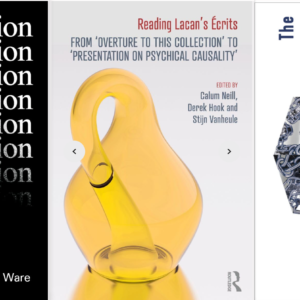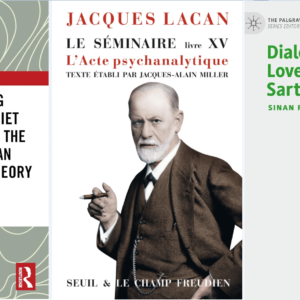News – August 2017
New publications first, and Derek Hook’s Six Moments in Lacan: Communication and identification in psychology and psychoanalysis was released last month by Routledge. The book introduces Lacanian psychoanalysis to an audience interested in psychology, while noting that this was a discipline Lacan was notoriously antagonistic towards. Topics such as communication, identity, otherness and inter-subjectivity are discussed, and concepts drawn from distinct moments in Lacan’s teaching are applied to the ‘psychological’ and unconscious dimensions of everyday life. Hook is also a co-editor of the Palgrave Lacan Series which in the last couple of years has produced some of the most original and varied work from the Lacanian field.
Relatedly, the Palgrave Lacan Series announced for publication in October the latest title in its collection. Adrian Johnston’s Irrepressible Truth: On Lacan’s ‘The Freudian Thing’ is a close reading of one of the major papers from the Écrits.
Josephine Sharoni’s Lacan and Fantasy Literature – Portents of Modernity in Late-Victorian and Edwardian Fiction was also published last month by Brill. The book takes a Lacanian view of several popular British fantasy texts of the late 19th century, such as Bram Stoker’s Dracula. Reviews from Todd McGowan and Jean-Michel Rabaté, and a full table of contents, are also now available on the Brill site.
Many recent titles from the French publishing house Eres were released in e-book form last month, making them more accessible to French-speakers in other countries. First amongst them is Charles Melman’s Lacan tout contre Freud which brings together his seminar series conducted from 1995-1998 at the Hôpital Henri Rousselle. Melman is a significant figure in the Lacanian world, and after Lacan’s death was one of the co-founders of the Association Lacanienne Internationale, which now spans seventeen countries. Melman has also produced his own versions of Lacan’s Seminars. Secondly from Eres last month, Fabienne Hulak’s La lettre et l’oeuvre dans la psychose looks at the place of artistic creation and creative work in relation to psychotic structure, and how it can be used therapeutically in the context of the transferential relationship. Jean-Louis Sous’ Lacan et la politique: De la valeur asks how Lacan’s thinking can be transferred to the political field, taking as its starting point Lacan’s proclamation in the Logic of Fantasy Seminar from 1966-1967 that “The unconscious is politics” (session of 10th May, 1967). And lastly from Eres, Jean-Pierre Cléro’s Lacan et la langue anglaise questions whether psychoanalysis should change according to the language in which it is practiced. For instance, why – according to Cléro – did Lacan suggest that speaking English did not lend itself to analysis, whether as analysand or as theorist? Cléro examines the use Lacan made in his work of the English language, borrowing psychiatric or psychological terms like ‘acting out’ and ‘splitting’, and makes the case that this was evidence of Lacan’s work-in-progress theorisation, demonstrating his interdisciplinary concern beyond the frontiers of French.
Among journals and reviews, Lacan.com last month published the latest edition of its online, free-to-access journal, The Symptom (17). It contains, among others: two papers by Jacques-Alain Miller, on ‘The Desire of Lacan’ and ‘Ethics in Psychoanalysis’; an interview with Slavoj Žižek by editor Josefina Ayerza; and Darian Leader’s introduction to the logic Lacan employs in Seminar XX, in ‘The Not-All’.
The latest edition of the NLS cartels newsletter 4+one, containing four papers written by members of NLS-registered cartels, was sent out in August and is available here. Contributions comprise commentaries on Freud and Lacan’s work, a paper on ethics, and the fourth on segregation.
Among other new free-to-access papers, Jasper Feyaerts and Stijn Vanheule’s paper ‘The Logic of Appearance: Dennett, Phenomenology and Psychoanalysis’ may also be of interest. The authors examine Daniel Dennett’s reconstruction of neurocognitive science, contemporary phenomenology, and psychoanalysis, in terms of a ‘logic of appearance’.
Following up on recent publications, Anna Fishzon interviews Patricia Gherovici on her latest book Transgender Psychoanalysis: A Lacanian Perspective on Sexual Difference in the first of two New Books in Psychoanalysis podcasts made available last month. Gherovici’s book was published by Routledge earlier this year. In the second, Lewis Kershner speaks to Philip Lance about his new work, Intersubjectivity in Psychoanalysis: A Model for Theory and Practice which was released in May, and bends towards the Lacanian orientation with influences also drawn from the works of Kohut and Winnicott.
Anyone interested in the work of some of Lacan’s contemporaries (and often students, or detractors) should check out The Unconscious in Translation, a publisher of English translations of work by Jean Laplanche, J.-B. Pontalis, and Dominique Scarfone. Many new titles have recently been released, and for the month of September they are running a sale offering each hardcover book for the price of a softcover.
Among the latest events, coming up in London on Saturday 23rd September is a one-day conference on the theme ‘Lacan’s English/La langue anglaise de Lacan’ by the Association de Psychanalyse Encore. The conference will be fully bilingual and the full programme is available here. Bookings can be made on Eventbrite.
The Lacan Circle of Melbourne will be hosting Russell Grigg later this month to discuss his recent translation of Lacan’s Seminar V, The Formations of the Unconscious. The event will take place in Melbourne, Australia on 27th September and is free, but tickets must be booked in advance.
The Freud Museum, London will be hosting an international conference on Fashion and Psychoanalysis on 14th and 15th October. The conference will bring together psychoanalytic thinkers and fashion experts to offer fresh perspectives in fashion thinking. Full agenda and list of speakers is now available, with Member bookings here (including staff and students of the London College of Fashion and Royal College of Art) and Non-Members here.
The Earls Court Clinical Group will be holding its next Open Meeting in London on 24th September. All are welcome. Each of the four speakers will give a short presentation on a clinical topic which will then be opened up for discussion. The meeting should run for about 2 hours and there will a break halfway through. Sign up via Eventbrite.
The Cyprus Society of the School of the Freudian Letter will be hosting a seminar on 11th November with Jean-Gerard Bursztein, under the title ‘Coextension of Psychoanalysis and Subjective Topology; a Future for Psychoanalysis’. Bursztein is a French psychoanalyst and doctor of philosophy who has been practicing in Paris since 1975, where he was a student of Jean-Toussaint Desanti, having worked on both the philosophy of mathematics and philosophy of sciences.
The SITE for Contemporary Psychoanalysis is returning this autumn for another series of engaging and informative clinical workshops in London. Philip Hill kicks off the new season with a three part mini-series, ‘How useful are Freud and Lacan’s ideas in the clinic?: a series of introductory workshops’ on 7th October, 21st October, 4th November. Full details here.
‘Rethinking organisational dilemmas with Lacan’ is the title of a workshop led by Philip Boxer and Barbara Williams which will take place in London over 12th and 13th November. Intended for managers and consultants, it will draw on Lacanian thinking to address the challenges posed by the “changes that networked and increasingly digitalized environments are driving”. It is organised by OPUS, a charity “devoted to understanding society from a psycho-social perspective”.
CFAR, in association with Bristol University, will be continuing its series of public seminars on the topics of neurosis, psychosis, and perversion, with Vincent Dachy speaking about ‘The structures we call clinical’ on 7th October. Details on the CFAR site, which also contains a list of its public seminar programme in London for the new academic year.
For upcoming events further ahead in the calendar, two calls for papers went out in the last month. The first was issued for the two-day ‘Unincorporated Psychoanalysis’ conference, taking place February 17th-18th, 2018 in San Juan, Puerto Rico. The event is organised by Das Unbehagen, and recordings from previous events by the group are available here.
Secondly, a call for papers went out for Lacanian Compass’ 11th Clinical Study Days on ‘The Delights of the Ego’, taking place in New York City, 9th-11th February, 2018. Case presentations on the theme of the meeting should be submitted by 15th October. Full details of how to submit can be found here.
Finally, August’s edition of the journal Psychoanalysis and History (19, 2) was a special issue dedicated to the late John Forrester. In particular, Darian Leader’s tribute brings out how close a reader of Freud – and how critical a reader of Lacan – Forrester was, particularly at a time in the early 1980s when Lacan made his introduction to British academia. Special praise is (justly) reserved for Forrester’s magnificent Language and the Origins of Psychoanalysis, which despite being published 35 years ago remains truly original in its re-examination of some of the core problems that the early Freud grappled with and which have since been somewhat glossed over in the retelling of this history.
Got news? Get in touch.




Leave a Reply